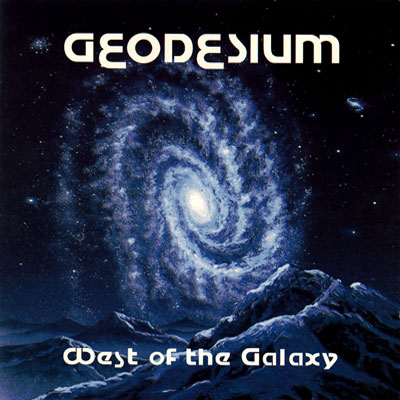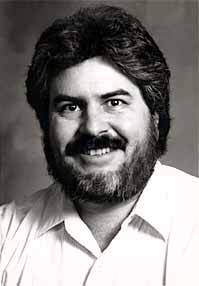

West of the Galaxy
Colorado composer's music takes listeners to the stars
When it comes to music, Mark C. Petersen is a man with the cosmos on his mind. The Colorado-based recording artist has been recording electronic space music for planetarium show soundtracks since 1975. With the release of his third album West of the Galaxy on compact disc, Mark's brand of cosmic music began reaching a wider audience.
Recent national airplay on the syndicated radio programs Music from the Hearts of Space and Musical Starstreams brought his music out of the rarefied environment of the planetarium, where his compositions have been well-known for years. Today, space music enthusiasts around the world are hearing his other-worldly compositions and clamoring for more.
"Immediately after the Music from the Hearts of Space show aired, we started getting phone calls, electronic mail and letters from listeners who had descended on their local record stores in search of the album," Mark said, explaining that since the album was available at the time only through mail order and some planetarium gift shops, those listeners didn't have much luck finding it unless they contacted him directly.
West of the Galaxy is a collection of space music composed between 1985-87. Most of the works on the album were composed as soundtrack music for planetarium shows. "They're absolutely the essence of space music," he says of the pieces, "and the album sells well in planetarium gift shops. People write to me all the time raving about what they hear on this CD."
Mark says that his interest in space permeates West of the Galaxy, and the planetarium provides an inspiring environment. "Space is where we belong, and space music is what puts us in the frame of mind to contemplate the wonders of the universe," he says. "And, in the planetarium we can visualize whatever universe we want."
Mark says that, through his music, "We can wander the plains of Mars, or drift above the clouds of Jupiter, or go out to the farthest reaches of space to witness the power of the quasars and galaxies."
It's important that their music not be Earth-based, classical symphonic music, which he says isn't always appropriate for planetary landscapes and universal views. To achieve the "sound of space", Mark uses an array of synthesizers, sampling keyboards and other electronic gear.
"Planets and galaxies and quasars — these are all unearthly things — and their music should be unearthly as well," he said. "Still, the synthesizer music I produce isn't weird, atonal, or avant-garde. People think of space as a very harsh, cold, forbidding environment, extremely hostile to human existence — and it is. One might expect that appropriate space music would be some forbidding, somber-sounding stuff. Yet I find immense beauty and grandeur in the cosmos, and my music often speaks to that aspect instead."
Mark's musical viewpoints are shared by an eclectic group of listeners around the world. Not long after its release, West of the Galaxy began receiving wider attention from listeners in the U.S. and Europe.
The opening and closing works on the album are The Grand Tour and On To Orion, written for a planetarium show about the journeys of the two Voyager spacecraft. The Ocean of Space is the selection that received the most airplay from the album. It features rippling harp-like arpeggios drifting over a wash of choral chords. The title cut West of the Galaxy has a steady, undulating feel, with a melody that Mark says evokes an inner vision of the West in the listener. "But, it's a 'space-music West'," he warns, "not cowboys and Indians and cactus." There are some up-tempo selections as well, titled Zephyr and Sky Flight. "Not everything in space is 'floating in limbo' stuff," he said with a smile.
Space music composition is a special art for Mark, and he says that it appeals not only to the ear, but to the mind, as well. "Space music is the science fiction of musical composition," he muses. "It's the ultimate depiction of the cosmos. It can take you on a personal voyage of discovery. It opens portals between the ear and the mind, and if you let it, it will transport you from the Earth to any place you can imagine. Until we can physically go out to the stars, space music is the likeliest vehicle space visionaries will have."
Throughout his career as a composer and as a planetarian, Mark has defined the genre of "planetarium space music", and his music enhances a new generation of planetarium programs and science center presentations.
Mark began recording electronic music with a large modular Moog synthesizer in 1971, while a student at the University of Colorado's College of Music. His space music first found an audience under the geodesic dome of CU's Fiske Planetarium.
Many pleased planetarium patrons would crowd around the control console after the shows, asking how they could obtain the great music they had heard during the shows. He started selling recordings of his music under the name Geodesium, a contraction of the words "geodesic dome" and "planetarium".
To market his music, Mark formed Loch Ness Productions in 1977, and has released many albums of space music since then — including "West of the Galaxy. The company has grown beyond its original mission of producing space music albums. Today, Loch Ness Productions is one of the foremost distributors of planetarium programs, space visuals, and music to the planetarium and science center community.
"We started out with a mailing list and a few thousand vinyl copies of my first album, GEODESIUM, piled up in the living room of my apartment in Boulder," he recalled. "It's just grown from there." Since then, more than 900 planetarium and science center facilities around the world make regular use of Loch Ness Productions products.
Those space music enthusiasts who want more of Mark's work are in luck. Since West of the Galaxy, Mark has recorded new music for many soundtracks, all featuring his signature planetarium music, and much of that work shows up on his latest albums.


